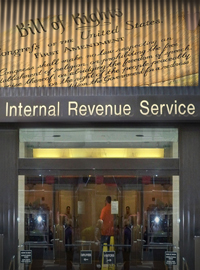| The IRS, Campaign Finance and Freedom of Association |
 |
|
By Timothy H. Lee
Thursday, May 16 2013 |
Amid the unfolding IRS scandal, one important lesson remains underreported. Going forward and from a broader perspective, it’s also one that may prove particularly potent and lasting. Specifically, what the debacle teaches in our ongoing debate over campaign finance regulation and the First Amendment freedom of private association without fear of retaliation or persecution. Absent that freedom, other rights can be effectively nullified. In that regard, the U.S. Supreme Court provided enduring guidance with its 1958 decision in NAACP v. Alabama. There, government authorities had demanded membership lists and other NAACP records as a prerequisite to conduct business in the state. The Court, however, held that compulsory disclosure of affiliation with groups engaged in advocacy chilled members’ ability to pursue their lawful interests: “Petitioner has made an uncontroverted showing that on past occasions revelation of the identity of its rank-and-file members has exposed these members to economic reprisal, loss of employment, threat of physical coercion, and other manifestations of public hostility. Under these circumstances, we think it apparent that compelled disclosure of petitioner’s Alabama membership is likely to affect adversely the ability of petitioner and its members to pursue their collective effort to foster beliefs which they admittedly have the right to advocate, in that it may induce members to withdraw from the Association and dissuade others from joining it because of fear of exposure of their beliefs shown through their associations and the consequences of this exposure.” Importantly, the Court added that official government harassment wasn’t the only peril. The possibility of private harassment following compulsory disclosure also posed an unacceptable risk: “It is not sufficient to answer, as the State does here, that whatever repressive effect compulsory disclosure of names of petitioner’s members may have upon participation by Alabama citizens in petitioner’s activities follows not from state action but from private community pressures. The crucial factor is the interplay of governmental and private action, for it is only after the initial exertion of state power represented by the production order that private action takes hold.” Today, we’re witnessing that very danger played out before our eyes. Over recent several years, one of the federal government’s most powerful agencies has persecuted American citizens solely on the basis of political belief. While conservative organizations and those critical of the Obama Administration were targeted by the IRS, the “IRS Gave Liberals a Pass,” according to the USA Today front-page headline. Pro-Israel organizations were also targeted, with Z Street alleging in a lawsuit that “it had been told by an IRS agent that because the organization was ‘connected to Israel,’ its application for tax-exempt status would receive additional scrutiny.” Moreover, the misconduct extended to “private community pressures” of the type referenced in the Supreme Court’s NAACP v. Alabama decision. As just one example, according to the left-leaning ProPublica’s own website, “The same IRS office that deliberately targeted conservative groups applying for tax-exempt status in the run-up to the 2012 election released nine pending confidential applications of conservative groups to ProPublica late last year.” In a sad irony, the NAACP’s own former Chairman Julian Bond applauded the IRS campaign, as did Nancy Pelosi (D – California) and other officials. Freedom of association for me, but not for thee, apparently. So what does all of this have to do with campaign finance regulation? It vindicates those of us who have fought to protect Americans’ right of confidential association, and indicts those who demand greater government oversight and compulsory disclosure in the name of campaign finance “reform.” After all, forcing 501(c)(4) organizations to begin surrendering private membership and donor lists to government authorities such as the IRS exposes citizens to abuse for simply exercising their First Amendment rights. The prevailing political question right now is the extent to which the IRS scandal, combined with the Benghazi coverup and the secret subpoena of Associated Press telephone records, will bring down the Obama Administration. That obviously depends on facts yet to be uncovered. One thing, however, is already certain. The IRS scandal alone erases the Obama Administration’s façade of benevolence and benignity. In a commencement speech this month to Ohio State University graduates, Obama admonished them to ignore anyone voicing wariness toward government tyranny. This demonstrates the invalidity of his words. And on every issue from campaign finance regulation to background checks to ObamaCare to federal agency overreach, it permanently answers the question, “What could possibly go wrong?” |
Related Articles : |
























